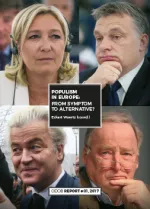Setting the Brexit agenda: Populism and UKIP in the United Kingdom

Word has it that in the United Kingdom it is no longer necessary to vote for UKIP (the Europhobic, extreme-right UK Independence Party,) to vote for its ideas. With many of Nigel Farage’s party’s ideas on the government’s agenda, the influence of UKIP is fundamental to understanding the dynamics of British politics both before and since the Brexit vote.
Hearing the Eurosceptic wing of the Conservative Party voice its approval for UKIP’s anti-Europe proclamations, David Cameron, then leader of the party, promised a referendum on the United Kingdom’s membership of the EU if they won the 2015 general election. During the Brexit referendum campaign, the UKIP thesis bolstered the “leave” campaign with its calls to “restore sovereignty” and opposition to immigration. Now Brexit is secured, a hard-line starting position for the negotiations with Brussels prevails, as may be seen in Theresa May's stated desires to leave the single market in order to tackle European immigration, and to remove the jurisdiction of the European Court of Justice.
UKIP’s ideology has permeated the agenda of the political forces of the United Kingdom’s centre ground, which is perhaps the most significant of populism’s effects on British politics. So much so that, even with UKIP engulfed in fratricidal infighting following Nigel Farage’s resignation as leader, many of their ideas have kept their place in the public debate since the referendum. This is true of Theresa May’s government, but also of the leader of the opposition, Jeremy Corbyn, who has never appeared willing to take radically different positions to the government on handling Brexit. Using the framework established by Diego Muro in this volume, it may be seen that UKIP and post-Brexit British politics are characterised by sharing key elements with the definition of populism.
The first of these is the way Brexit was presented as a confrontation between the “common people” and the establishment, which is characteristic of populist forces that claim to empathise with the concerns of the “people” and attack the interests of their leaders. During the referendum campaign the division in the Conservative Party on the one hand and the pressure of its more Eurosceptic wing and UKIP on the other turned Brexit into a political weapon that was used against David Cameron's government, which watched its popularity fall as the vote got closer.
The criticisms of the establishment included targets as varied as the Bank of England, the International Monetary Fund, leaders of major global powers, unions and employers – all of whom favoured “remain” – and led Cameron's former justice secretary to make his famous declaration that “Britons have had enough of experts”. This animosity towards the elites has lingered since the referendum, with British tabloids going as far as to call the judges obliging Theresa May to submit the triggering of Article 50 of the Treaty on European Union that leads to Brexit to the British parliament “enemies of the people”.
Secondly, the Brexit campaign put two key elements of the populist agenda at centre stage: sovereignty and immigration. Nigel Farage's “we want our country back” inspired the official slogan of the Brexit campaign: “take back control”. Alongside the concerns about employment and the economy in general, during the campaign around 30% of those surveyed believed that a strong reason for going to the polls was the United Kingdom's “right to act independently”. At the top of her priorities for negotiating an agreement with the EU after Brexit, Theresa May has placed “control of our own laws” and putting an end to European jurisdiction.
Just behind comes the need to “control immigration” from Europe, which translates into the desire to leave the single market and the freedom of movement it brings. Immigration was also high on the list of British people's concerns in the months leading up to the referendum (nearly 50% of citizens stated this, while 30% recognised that immigration would be a decisive factor in their vote). Nevertheless, in contrast to other populisms in Europe, the United Kingdom’s rejection of immigration has not taken on such anti-Islam overtones, but has largely centred on the arrival of European citizens.
Finally, Brexit has also highlighted how difficult it is to reach consensus on the factors that cause populism. Some studies have emphasised classic socioeconomic issues such as poverty, vulnerability and lack of opportunities as explanatory factors in the Brexit vote, relating them to the wave of rejection generated by the “losers of globalisation”. Others have underlined the variable of education, without denying the existing correlations between this and other structural elements such as the economic situation. Some have even explained the vote in favour of leaving the EU as something connected to personal values, finding surprising levels of correlation between support for Brexit and support for the death penalty and the rejection of open societies.
In any event, Brexit has turned out to be the first in a series of reactions “against the system”: from Trump’s victory in the United States and Marine Le Pen's rise in France, via Orbán in Hungary and Wilders in Holland. All form part of a much feared “populist international” – though their roots and expressions take different forms depending on the national environments in which they act. Brexit remains something in which these leaders see themselves reflected, thanks, specifically, to its capacity to make ideas such as “taking back control” and fighting against “those from abroad” conventional. Previously in the hands of extremist parties such as UKIP, these ideas are now at the centre of Britain’s political agenda.